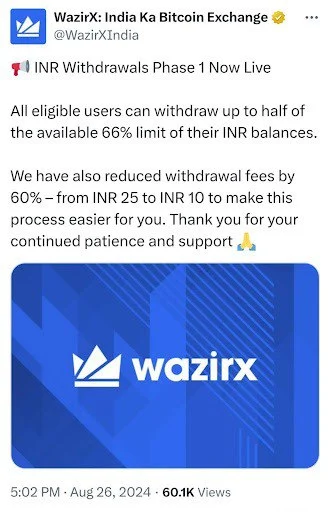On October 18, 2024, a major issue involving WazirX, a popular cryptocurrency exchange, came to the attention of the Delhi High Court. An investor named Jaivir Bains filed a legal complaint, wanting action taken against WazirX. His main concern was that the company had mixed customer funds to cover losses after hackers stole a large amount of money.
This hacking incident wasn’t small—it involved 1,900 crore rupees, which is about $230 million. The hackers gained access through a multi-signature wallet, a system used to store cryptocurrencies securely. Justice Sanjeev Narula was the judge handling this case.
What Happened in the WazirX Hack?
The Hack in July 2024
The hack happened in July 2024. WazirX later said that the theft was caused by a data mismatch between what was shown on their system and the actual transactions. This mistake allowed hackers to steal a huge chunk of digital assets from the exchange.
Nischal Shetty, the founder of WazirX, explained that almost half of the company’s total digital assets were stolen during the hack.
What is a Multi-Signature Wallet?
A multi-signature wallet, also known as a multi-sig wallet, requires multiple people to approve a transaction before it can go through. In WazirX’s case, six signatories were involved:
- Five people from WazirX’s team.
- One person from Liminal, a third-party company that helps with custody solutions.

Unfortunately, the hackers managed to exploit a flaw in this system and used it to steal assets.
How Did WazirX React After the Hack?
WazirX had to figure out a way to protect its users from financial loss. To deal with the situation, the company decided to combine hacked and unhacked funds. This way, no user would experience a total loss. However, this upset investors who were not affected by the hack because their safe funds were now mixed with stolen ones. Some users felt this decision was unfair since they believed their untouched money was being used to cover other people’s losses.
WazirX also told its users that only 66% of their money in INR (Indian Rupees) was available for withdrawal. The remaining 34% of funds were still stuck on the platform, adding to the users’ frustration.
The Legal Battle Begins: Petition Filed
Investor’s Complaint
Investor Jaivir Bains was one of the people affected by this situation. He said that he tried to withdraw his money, but WazirX stopped him, saying that new rules from the Financial Intelligence Unit (FIU) were the reason. When he tried to withdraw again later, WazirX refused, pointing to a change in their user agreement.
Feeling frustrated, Bains approached the Delhi High Court to take action. His complaint was filed through Advocate Ankit Bhatia, who argued that the situation was unfair to unaffected investors. He also claimed that no proper investigation had been done and that the stolen money had been moved to Singapore, making it even harder to recover.
FIU and ED Involvement
The petition criticized the FIU and the Enforcement Directorate (ED) for not taking timely action. These government agencies are supposed to monitor financial activities to ensure companies like WazirX follow rules and avoid illegal activities. However, the petition claimed that both agencies failed to act, allowing the hackers to get away with the money.
What Did the Delhi High Court Say?
Court’s Response
The Delhi High Court listened carefully to the arguments from both sides. The court acknowledged that the hacking incident was a serious matter. It also understood the frustration of investors like Bains, who believed their money had been unfairly mixed with stolen funds.
However, the court said this was mostly a civil matter that could be resolved by looking at the terms of the user agreement between WazirX and its users. The judge explained that government agencies like the FIU could only step in if there was clear evidence that WazirX broke any laws.
The court also mentioned that creating new rules to handle cases like this was beyond its authority.
Investigation Ordered
Even though the court decided that this issue was primarily a private matter between WazirX and its users, it still asked the police to investigate the complaint further. The court directed the Assistant Commissioner of Police (ACP) to look into whether the hacking was done internally (by WazirX) or by external hackers. If any solid evidence came up, the FIU could also get involved.
The Core Issue: Was WazirX’s Decision Fair?
One of the biggest complaints from the petitioner was that WazirX’s decision to distribute the stolen funds among all users—both affected and unaffected—was unfair. Many investors believed that WazirX had violated their trust and user agreement by doing this.
The petitioner had invested 22 lakh INR in WazirX and felt cheated by the way the company handled the situation. He also blamed the ED and FIU for not acting quickly enough to prevent the funds from being transferred abroad.
Lessons Learned from the WazirX Hack
This hacking incident was a wake-up call for the entire cryptocurrency community in India and beyond. It showed that even well-established exchanges like WazirX are not immune to security risks.
It also highlighted the importance of government oversight in the crypto world. Investors and exchanges must work together to ensure that funds are safe, and stronger regulations are needed to prevent similar incidents in the future.
Conclusion
The WazirX hack is not just about stolen money—it’s a reminder of how important it is to have secure systems and transparent practices in place. Although the Delhi High Court treated this as a civil dispute, it still asked the police to investigate further.
Going forward, cryptocurrency exchanges and regulators need to work together to build trust and ensure that investors’ funds remain protected. This case will likely encourage better rules and improved security measures for the entire cryptocurrency industry.
Meanwhile, investors like Jaivir Bains are left hoping that they can recover their money and that incidents like this won’t happen again.
